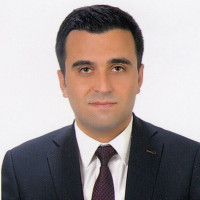Prof. Dr. Hikmet Yıldırım CELKAN Özel Sayısı
Research Article
4. Dijitalleşme Sürecinde Okul Temeli Program GeliştirmeResearch Article
6. İlkokul Zümre Öğretmenler Kurulu Kararlarının Uygulanma DüzeyiIssue Editorial Board

Dr. Mehmet Başaran is a postdoctoral researcher at the STEM Education Center, University of Minnesota. He also serves as an Associate Professor at Gaziantep University’s Faculty of Education, specializing in Curriculum and Instruction. He completed his Ph.D. at Gaziantep University, focusing on the applicability of the STEM approach in preschool education, and holds an M.S. in Curriculum and Instruction with a Teaching Certificate from İhsan Doğramacı Bilkent University. During his master’s, he had a short visit to the University of Cambridge for the PGCSE Secondary Mathematics program. He earned his undergraduate degree in Mathematics from Hacettepe University.
Dr. Başaran’s research interests lie in the areas of STEM program development, teacher education, and international schools, with a particular focus on early childhood STEAM education. He has made significant contributions through his work on computational thinking, coding skills assessment, and project-based learning for preschool children. His expertise is reflected in his involvement with several prestigious journals.
He has held visiting professor positions at various universities, including Zielona Gora University in Poland, Hasan Kalyoncu University, and Jordan University, reflecting his international experience in education. Furthermore, Dr. Başaran has been actively engaged in numerous national and international research projects, securing grants from prominent organizations such as the European Union and TÜBİTAK. His ongoing projects focus on STE²AM education, the integration of digital tools in early education, and the development of innovative teaching methods.
In addition to his academic achievements, Dr. Başaran is the founder of Dünyatek Bilişim Teknoloji A.Ş., a company dedicated to information technology solutions. His numerous awards, including the 2023 Science Award from Gaziantep University and TÜBİTAK recognition, underscore his leadership in educational research and innovation.

Dr. Eyüp Cücük was born in Gaziantep in 1989. He completed his undergraduate education in the Department of History at Hacettepe University Faculty of Letters in 2011. In the same year, he started his first master's degree in the Department of Modern History at Gaziantep University, which he completed in 2017. He then completed his PhD program in the same department in 2020. During this period, he also completed his second master's degree in the Department of Educational Programs and Instruction at the Gaziantep University Institute of Educational Sciences, which he started in 2013 and completed in 2015. Between 2014-2021, he worked as a Research Assistant (50-d) at the Gaziantep University Institute of Educational Sciences. Supported by the TÜBİTAK Domestic Post-Doctoral Research Grant Program, he continued his work as a Post-Doctoral Researcher at Istanbul University-Cerrahpaşa Hasan Ali Yücel Faculty of Education between 2021-2023.
Dr. Cücük's research interests include history of education, history of educational writing, educational sciences, history of educational policies, modernization in education, and philosophical, social and historical foundations of education. He has published numerous national and international papers, articles, books and book chapters in these fields. He has also been involved in many national and international research projects as a researcher, assistant staff, and fellow.
Aim & Scope
Aim
The aim of the GAUN-JES is to follow the latest developments and increases the quality of the work done in the field of education and science in Turkey; to provide an environment of equal opportunity that allows academicians working at different universities to publish academic publications; to support theoretical and research-oriented studies; to increase the quality of research and to encourage mutual sharing of national and international academic research
GAUN-JES is an open access journal that works for the free movement and dissemination of information.
Although GAUN-JES is a multidisciplinary publication to which academicians contribute to a large extent, it also encourages publications from students who are experts in their field or who do postgraduate studies.
Scope
Gaziantep University Journal of Educational Sciences publishes theoretical or applied studies within the scope of educational research. The themes involved in the journal are listed below.
- Physical Education
- Educational Philosophy
- Educational Sociology
- History of the education
- Educational Technologies
- Educational Administration
- Educational Measurement and Evaluation
- Program Development in Education
- Science and Mathematics Education
- Fine arts Education
- Pre-school Education
- Special Education
- Guidance and Psychological Counseling
- Basic Education
- Turkish and Social Studies Education
- Foreign Language Education
- Adult Education
Author Guidelines
Author Guidelines
1. The authors can download a Word file in accordance with the format of our journal by clicking on the attached file and format their articles according to the style in this file.
2. When the authors upload the article to the journal, it is assumed that they have accepted the points stated in the Editorial Policy. Also, they also do not need to upload a Copyright Transfer Form.
3. The articles that do not meet the publication and grammar rules are directly rejected.
4. Dear authors, when you submit your article to Dergipark, the author order you enter will be the same author order that will take place and cite after the acceptance of the publication. Please make your choices accordingly. GAUN-JES accepts system data; the changes requests to be made in this regard will not be accepted.
Ethical Principles and Publication Policy
Ethical Principles and Publication Policy
Article publication and Ethical principles
Manuscripts should be uploaded to the system in accordance with the template containing the writing rules, without author names and information.
By uploading the manuscripts to the journal, the author;
- is considered that they have accepted that Gaziantep University Journal of Educational Sciences and Editorial Board does not have the responsibility for the content, results, information, findings and comments of each article uploaded to the journal.
- accept that the article is original and all authors has participated in the work individually; that it has not send to any other journal for publication and has not published before; that the text, figures and documents in the study do not violate the copyrights of other persons.
Extended Abstract
Since our journal is in the application process for being scanned in international indexes, it requires 750-1000 words abstract. Authors can add the extended abstracts after the article is accepted, if they wish.
Ethics Committee Approval
An Ethics Committee Approval document should be submitted for the articles to be uploaded to the journal system, if necessary. TR Index has added some items on the ethical rules to its 2020 standards.
1. Ethics Committee Approval and/or Legal/Special Permission is required for all kinds of research conducted with qualitative or quantitative approaches that require data collection from participants through survey, interview, focus group work, observation, experiment and interview techniques.
2. The articles must state whether an ethical committee approval and/or legal/special permission is required or not. If these approvals are required, then it should be clearly presented from which institution, on what date and with which decision or number these approvals are obtained.
3. If the study involves the use of human or animal subjects, then it must be stated that the study has been carried out in accordance with the standards in the international declaration, guidance, etc.
About plagiarism
Each article accepted to be published in Gaziantep University Journal of Educational Sciences will be subjected to plagiarism examination before publication. The articles with an overall similarity index of greater than 15% will be returned.
Price Policy
No fee is charged from the authors for the articles submitted to our journal.
In addition, all of the articles published in our journal are subject to open access.








